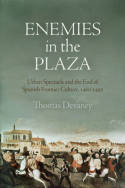Enemies in the plaza
urban spectacle and the end of spanish frontier culture, 1460-1492
- ISBN: 9780812247138
- Editorial: University of Pennsylvania Press
- Fecha de la edición: 2015
- Lugar de la edición: Pennsylvania. Estados Unidos de Norteamérica
- Encuadernación: Cartoné
- Medidas: 24 cm
- Nº Pág.: 256
- Idiomas: Inglés

Toward the end of the fifteenth century, Spanish Christians near the border of Castile and Muslim-ruled Granada held complex views about religious tolerance. People living in frontier cities bore much of the cost of war against Granada and faced the greatest risk of retaliation, but had to reconcile an ideology of holy war with the genuine admiration many felt for individual members of other religious groups. After a century of near-continuous truces, a series of political transformations in Castile-including those brought about by the civil wars of Enrique IV's reign, the final war with Granada, and Fernando and Isabel's efforts to reestablish royal authority-incited a broad reaction against religious minorities. As Thomas Devaney shows, this active hostility was triggered by public spectacles that emphasized the foreignness of Muslims, Jews, and recent converts to Christianity. Enemies in the Plaza traces the changing attitudes toward religious minorities as manifested in public spectacles ranging from knightly tournaments, to religious processions, to popular festivals. Drawing on contemporary chronicles and municipal records as well as literary and architectural evidence, Devaney explores how public pageantry originally served to dissipate the anxieties fostered by the give-and-take of frontier culture and how this tradition of pageantry ultimately contributed to the rejection of these compromises. Through vivid depictions of frontier personalities, cities, and performances, Enemies in the Plaza provides an account of how public spectacle served to negotiate and articulate the boundaries between communities as well as to help Castilian nobles transform the frontier's religious ambivalence into holy war.






